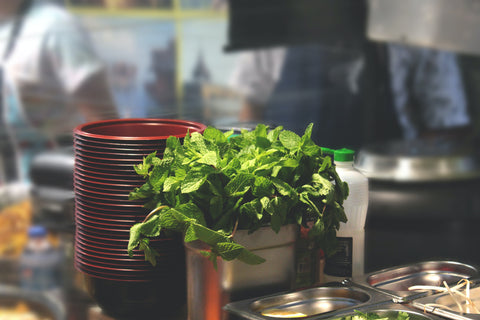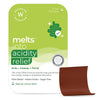No one is immune to a gassy stomach. As embarrassing as it can be, it is an uncomfortable experience that can often lead to other problems like bloating, stomach cramps, heaviness, and heartburn. When excess gas gets collected within the gastrointestinal tract, the condition is called flatulence. While there are many ways to tackle and manage the symptoms, some people look for Indian home remedies for gas and acidity. Many turn to Ayurvedic medicine for acidity and gastric issues for long-term relief.
Ayurvedic medicine is one of the world’s oldest holistic approaches to balancing the mind, body, and spirit. In this article, we provide you with a list of 15 Ayurvedic remedies for gas and acidity. But before we get into that, let’s see what causes gas and acidity.
What is Acidity?
Food, when consumed, needs to travel through the esophagus (food pipe) to the stomach. This should be a one-way process. Generally, the esophagus tube has a band of muscles that act as doorways that open and shut when food enters the stomach. Its primary function is to keep the stomach's contents separate from the esophagus. Certain factors, like stress and foods like citrus, can cause this sphincter to relax. This may cause backflow of contents like food and acids from the stomach to the esophagus, leading to heartburn. Acid reflux is also known as GERD(Gastroesophageal Reflux Disorder).
This acid reflux may lead you to taste the food acid at the back of your mouth, which can be an unpleasant experience.
The primary symptom of acidity is heartburn, a burning sensation in the chest often accompanied by regurgitation of stomach contents into the throat. This discomfort can extend to the upper abdomen, and individuals may also experience bloating, belching, and a sour taste in the mouth. In severe cases, acidity can lead to ulcers or gastritis.
Typical acidity causes include overeating, consuming spicy or greasy foods, excessive caffeine or alcohol intake, and stress. Gastroesophageal reflux disease (GERD) is a chronic condition where acidity is a prevalent symptom.
Acidity can be managed through lifestyle modifications such as eating smaller, more frequent meals, avoiding trigger foods, maintaining an upright posture after meals, and managing stress. Antacids, or medications that reduce stomach acid production, are also commonly used for relief.
Understanding the causes and symptoms of acidity is essential for effective management and overall digestive health. Consultation with a healthcare professional is advisable for persistent or severe cases of acidity.
What Causes Gas and Acidity?
We all release gas either through the mouth, in the form of belching, or through the rectum.
To first understand the problem, it’s essential to know why it happens in the first place. There are many ways in which you get gas in your digestive system. Firstly, we all tend to swallow air while eating or drinking, which causes gases like nitrogen and oxygen to enter the body. Secondly, during digestion, gases like methane, carbon dioxide, and hydrogen are produced, which accumulate in the stomach, causing discomfort if created in excess and not released.
It also depends on the food you eat daily. Without enough water, your stomach won't easily digest if you consume high-fiber foods like broccoli, cabbage, rajma, chole, and lentils. Your colon, which contains many bacteria, will break the food down as it passes through. During this process, a lot of gas will be released, which, if accumulated, can cause bloating, nausea, acidity, acid reflux, or other uncomfortable symptoms.
Acidity, on the other hand, results from the excess production of stomach acid or its reflux into the esophagus. Contributing factors include a diet rich in spicy or fatty foods, smoking, alcohol, caffeine, obesity, stress, and conditions like gastroesophageal reflux disease (GERD). Identifying and addressing these triggers is key to managing gas and acidity.
Common Foods That Trigger Gas and Acidity Problems
1. Spicy Foods
Capsacian, present in spicy foods, tends to delay gastric emptying. That is, they make foods sit longer in the gastrointestinal tract, which makes the stomach acid leak back into the esophagus, causing heartburn. Also, spicy foods tend to trigger the esophagus, worsening heartburn symptoms. Some individuals may be more sensitive to spicy and sour foods than others, so they develop acidity quickly after consuming such foods.
2. Sour Foods
Citrus foods and juices being highly acidic can further aggravate the symptoms of acidity. Also, these foods tend to relax the esophageal sphincter, which further contributes to acid reflux. Sour foods, while flavorful, can further contribute to gas and acidity due to their acidic nature. When consumed, sour foods may stimulate excess acid production in the stomach, potentially leading to acidity. Additionally, the tartness can irritate the esophageal lining, increasing the risk of acid reflux and digestive discomfort.
3. White Flour Products
One of the white flours is maida, also known as refined flour. This flour is another contributor to gas and acidity. The refined carbohydrates in maida move quickly through the digestive tract due to the absence of fiber, leading to gas, bloating, and cramping symptoms. Moreover, refined flour is also considered highly acidic, as refining eliminates a significant portion of the grain's natural alkaline minerals, such as magnesium and potassium.
4. White Sugar
Consuming excessive white sugar can lead to digestive issues such as gas and acidity. Sugar can ferment in the gut, feeding the bad bacteria-producing gas while promoting an acidic environment that may cause discomfort, cramping, spasms, and pain. Reducing sugar intake and opting for healthier alternatives can help alleviate these problems.
5. Smoking
Smoking further worsens the symptoms of acid reflux. The nicotine found in cigarettes acts as a muscle relaxant; thus, by relaxing the muscles of the esophageal sphincter, it leaks stomach acid into the esophagus. The same nicotine is also responsible for creating a more acidic environment, worsening your symptoms of heartburn.
6. Excessive intake of Tea & Coffee
Although there are many contradictory studies, some have shown that excessive caffeine intake through tea and coffee may further aggravate your acid reflux symptoms as caffeine tends to lower the esophageal sphincter pressure, which is responsible for the backflow of gastric contents in the esophagus.
7. Alcohol
Alcohol consumption can trigger gas and acidity in several ways. It can relax the lower esophageal sphincter, leading to acid reflux and acidity. Alcohol also irritates the stomach lining, increasing acid production. Additionally, it can disrupt the balance of gut bacteria, potentially causing gas.
Home Remedies for Gas and Acidity Problems
Most of the factors that cause gas, trigger acid reflux as well. Ayurveda states that an imbalanced agni (one of the essential elements) causes a weakened digestive system. So, the best way to treat gas and acidity is by balancing out this metabolic fire by following the below-mentioned Ayurvedic remedies.
Follow these Ayurvedic remedies for gastric issues and acidity (गैस की रामबाण आयुर्वेदिक दवा).
1. Asafoetida (Hing):
Asafoetida or hing gives you instant relief from acidity. If you mix half a teaspoon of the spice with lukewarm water and drink it, you'll be able to relieve yourself from excess gas and the resultant acidity. Asafoetida is known for its anti-flatulent, antispasmodic, anti-inflammatory, and antiseptic properties. According to Ayurveda, when vata dosha (space and air) increases in the colon, gases may accumulate and build up. Hing helps to balance out this dosha in the colon. Moreover, you can add a dash of this spice every time you make dishes that cause flatulence, such as legumes, chickpeas, pulses, etc. You can also mix hot mustard oil with hing and massage it around your belly button to give you some relief.

2. Lime juice with baking powder:

3. Cumin seeds/jeera water:

4. Curd or dahi:

5. Ginger:

6. Mint Leaves:

7. Jaggery:
8. Bananas:
9. Indian Gooseberry:
10. Mulethi:
11. Pumpkin Juice
12. Tulsi:
13. Cardamom
14. Cloves
15. Buttermilk
Buttermilk is a renowned Ayurvedic medicine for gas and acidity. It's a probiotic-rich beverage that can balance the gut's flora, aiding digestion. The lactic acid in buttermilk helps neutralize stomach acidity and relieves indigestion. Consuming buttermilk regularly is a traditional and effective way to alleviate gas and acidity.
How Ayurveda Improves Digestive Power
Ayurveda, the ancient system of holistic medicine, emphasizes the vital role of digestive power, or Agni, in maintaining overall health. It employs a multifaceted approach to enhance digestion. Ayurvedic dietary principles prescribe personalized nutrition based on an individual's dosha (Vata, Pitta, or Kapha). Mindful eating practices, such as thorough chewing and mealtime focus, initiate the digestive process effectively. Ayurvedic herbs like ginger and cumin are known for their digestive benefits, while daily routines (Dinacharya) harmonize with nature's rhythms. Detoxification therapies like Panchakarma remove toxins, and yoga and pranayama exercises strengthen the digestive system. Lifestyle choices, including stress management and quality rest, further contribute to robust Agni, promoting optimal nutrient absorption and overall well-being.
In Conclusion:
Acid reflux, commonly termed acidity, develops when food or other contents, such as acids, travel backward at times up to your esophagus and throat, causing symptoms like heartburn, regurgitation, and discomfort.
While these Ayurvedic remedies can help your gut, you can also try out Wellbeing Nutrition's Probiotic + Prebiotic supplement that supports your digestive health, neutralizes toxins, improves metabolism, and helps prevent other gut-related issues. With 36 billion (CFU) active live cultures per serving, your gut microbiome will thrive and be healthy, ex all digestive problems like acidity, gas, and bloating, to name a few.
FAQ’S
1. Which Ayurvedic medicine is best for gas tablets?
The best Ayurvedic medicine for gas trouble varies depending on individual factors, and it's recommended to consult with an Ayurvedic practitioner for personalized guidance.
2. How can I reduce gas permanently?
Reducing gas Instantly and permanently often involves dietary modifications, such as avoiding gas-inducing foods, maintaining a regular eating schedule, and addressing any underlying digestive issues with the guidance of a healthcare professional.
3. What stops gas naturally?
Natural methods to reduce gas include avoiding gas-producing foods, chewing food thoroughly, and incorporating digestion-friendly herbs and spices like ginger or fennel into your diet.
4. Which fruit is good for gastric?
Banana melon, apples, and pears are often considered good for digestion and can help with gastric issues.
5. Does drinking hot water relieve gas?
Yes, drinking hot water can help relieve gas by promoting digestion and soothing the digestive system.
6. How to remove gas from the stomach instantly using home remedies?
You can remove gas from the stomach instantly using home remedies like drinking asafoetida (hing) water, jeera water, or lime juice with baking soda, all of which help relieve trapped gas and ease bloating. These Ayurvedic remedies work by improving digestion and balancing gut health.
References:
• Gas in the Digestive Tract, (https://www.urmc.rochester.edu/encyclopedia/content.aspx?ContentTypeID=85&ContentID=P00369)
• Belching, Bloating and Flatulence, American College of Gastroenterology, (https://gi.org/topics/belching-bloating-and-flatulence/)
• Azpiroz F. Intestinal gas dynamics: mechanisms and clinical relevance. Gut. 2005;54(7):893-895. doi:10.1136/gut.2004.048868. (https://www.ncbi.nlm.nih.gov/pmc/articles/PMC1774596/)
• Mahendra P, Bisht S. Ferula asafoetida: Traditional uses and pharmacological activity. Pharmacogn Rev. 2012;6(12):141-146. doi:10.4103/0973-7847.99948. (https://www.ncbi.nlm.nih.gov/pmc/articles/PMC3459456/)
• Enhancement of digestive enzymatic activity by cumin (Cuminum cyminum L.) and role of spent cumin as a bionutrient, K.S. Muthamma Milan, Hemang Dholakia, Purnima Kaul Tiku, Prakash Vishveshwaraiah, Food Chemistry, (https://www.sciencedirect.com/science/article/abs/pii/S0308814608002483)
• Yogurt and gut function, Oskar Adolfsson, Simin Nikbin Meydani, Robert M Russell, The American Journal of Clinical Nutrition, (https://academic.oup.com/ajcn/article/80/2/245/4690304)
• Nikkhah Bodagh M, Maleki I, Hekmatdoost A. Ginger in gastrointestinal disorders: A systematic review of clinical trials. Food Sci Nutr. 2018;7(1):96-108. Published 2018 Nov 5. doi:10.1002/fsn3.807, (https://www.ncbi.nlm.nih.gov/pmc/articles/PMC6341159/)






























Leave a comment